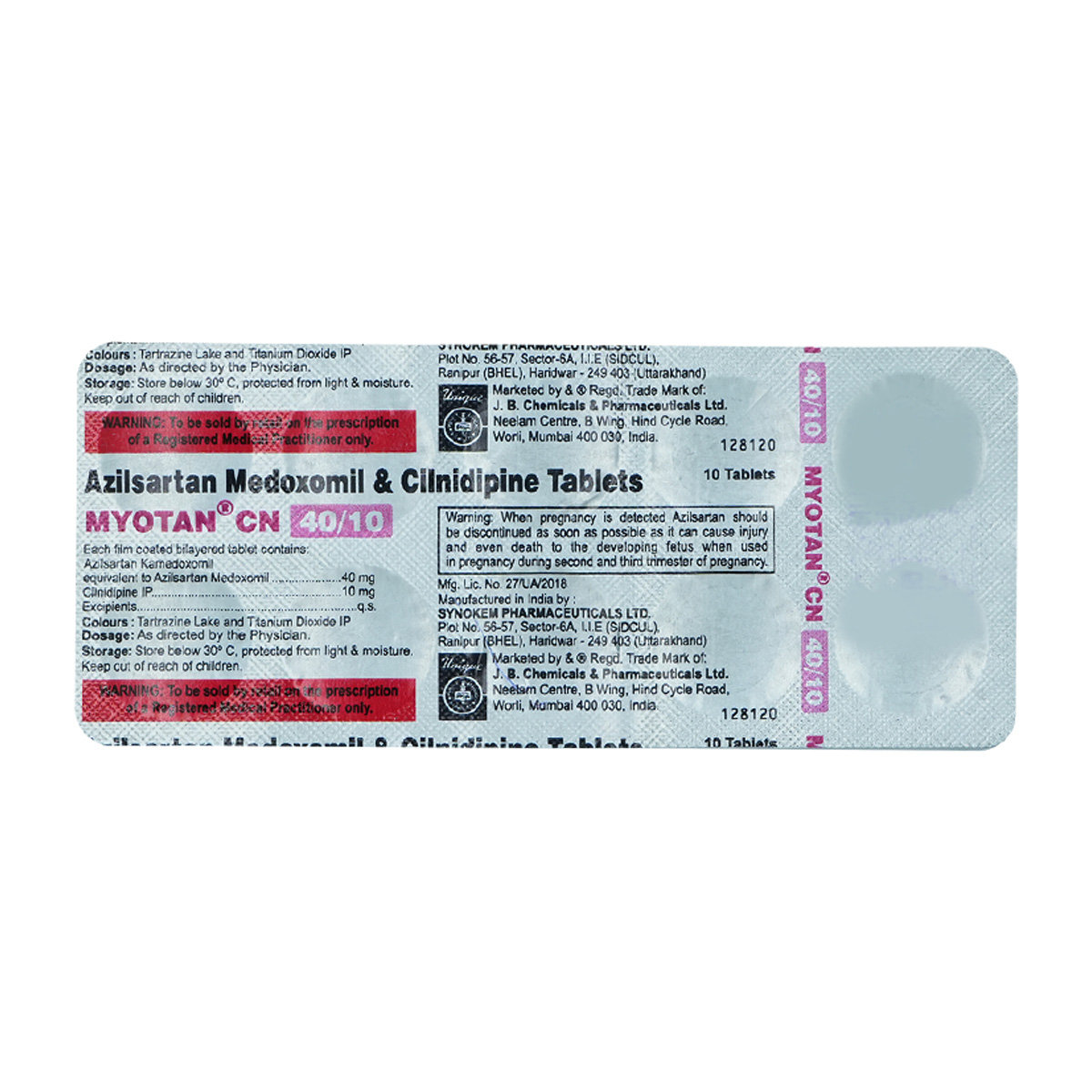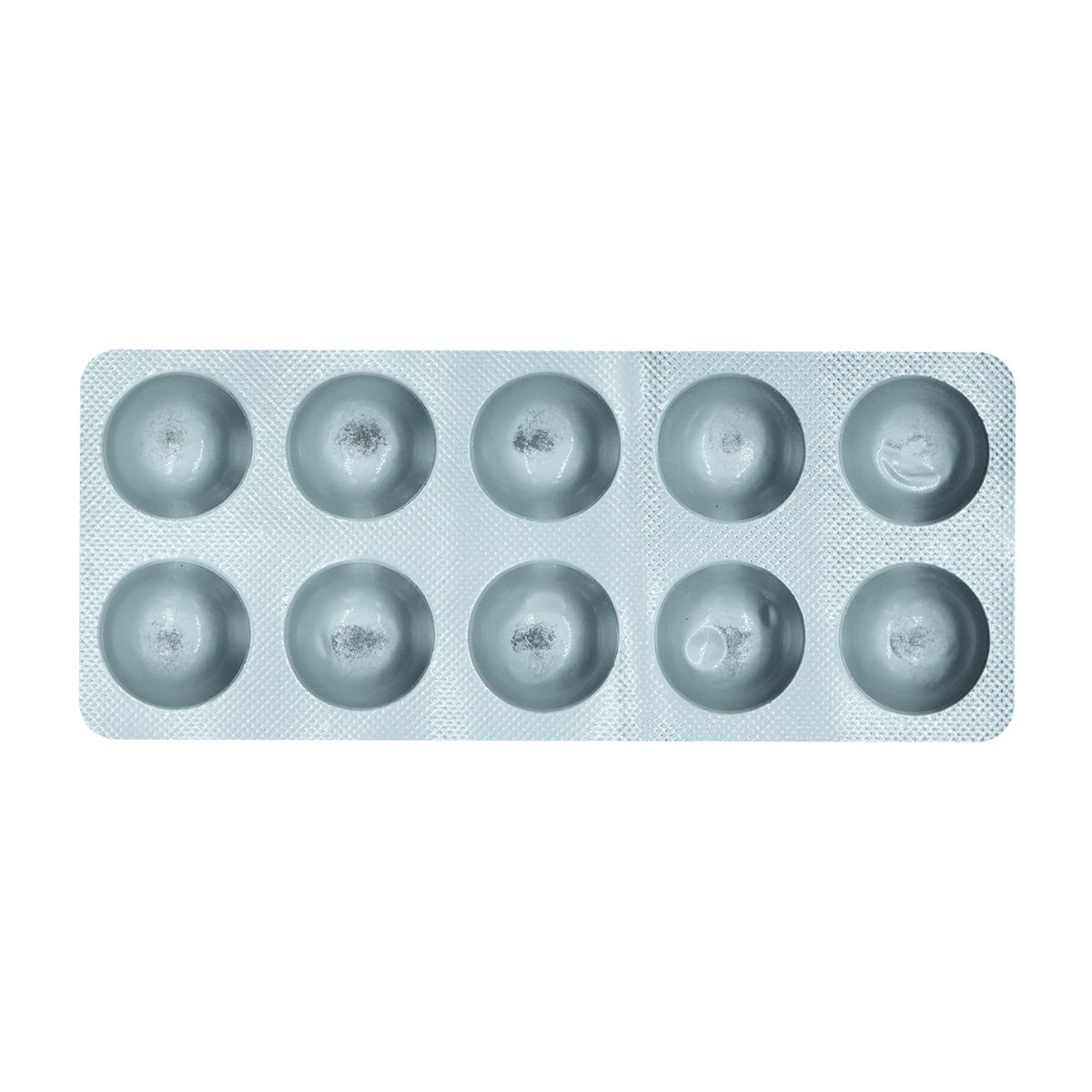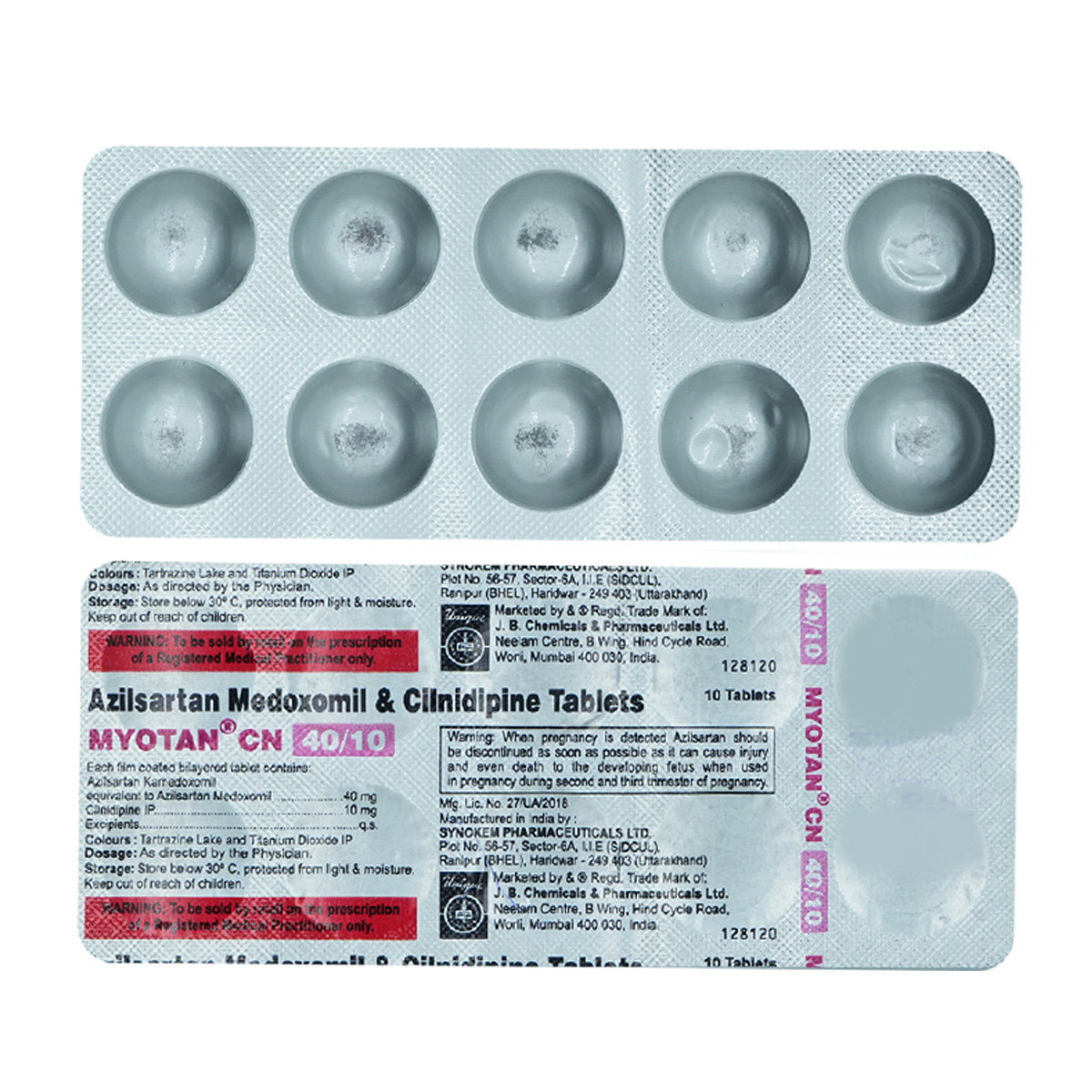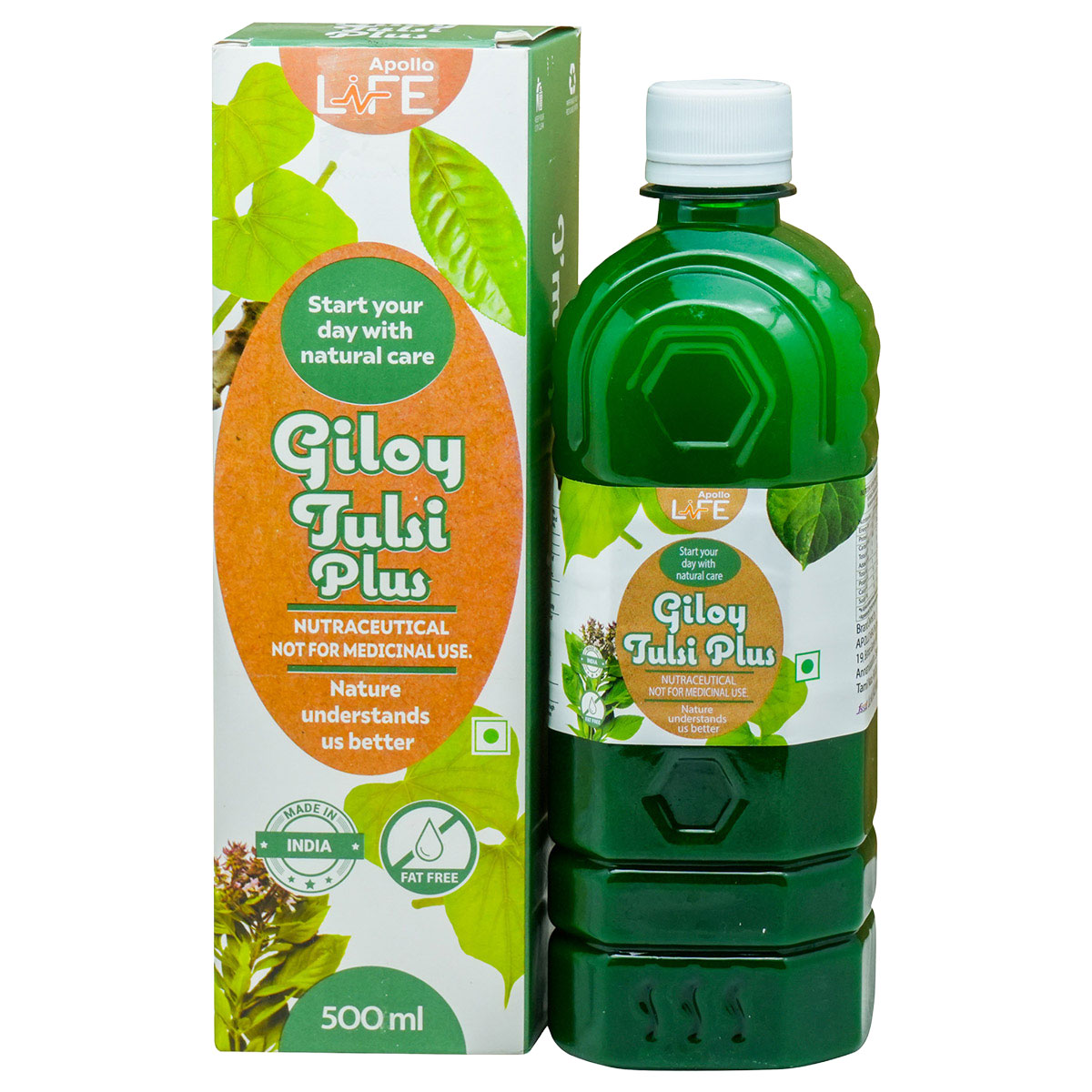Myotan CN 40/10 Tablet 10's



MRP ₹164
(Inclusive of all Taxes)
₹24.6 Cashback (15%)
Myotan CN 40/10 Tablet is an anti-hypertensive medication primarily used to treat high blood pressure (hypertension). It contains Azilsartan, Medoxomil, and Cilnidipine. Azilsartan Medoxomil is an angiotensin receptor blocker (ARB) that blocks the hormone angiotensin; this helps relax the blood vessels, allowing the blood to flow more smoothly and the heart to pump more efficiently. Cilnidipine is a calcium channel blocker that relaxes the blood vessels; this reduces the workload on the heart and makes the heart more efficient at pumping blood throughout the body. Together, this medication helps lower raised blood pressure.
Know Your Delivery Time
Provide Delivery Location

Secure Payment

India's Most Trusted Pharmacy

Genuine Products
Synonym :
Composition :
Manufacturer/Marketer :
Consume Type :
Return Policy :
Expires on or after :
About Myotan CN 40/10 Tablet
Myotan CN 40/10 Tablet belongs to the class of drugs called anti-hypertensive agents primarily used to treat high blood pressure (hypertension). Hypertension is a medical condition in which the blood pressure is elevated persistently in the arteries. High blood pressure is mostly caused by obesity, diabetes, smoking, high salt intake, stress, lack of physical activity or ageing.
Myotan CN 40/10 Tablet consists of two medicines, Azilsartan Medoxomil and Cilnidipine. Azilsartan Medoxomil is an angiotensin receptor blocker (ARB) that works by blocking the hormone angiotensin. This helps relax the blood vessels, allowing the blood to flow more smoothly and the heart to pump more efficiently. Cilnidipine is a calcium channel blocker that acts by relaxing the blood vessels. This reduces the workload on the heart and makes the heart more efficient at pumping blood throughout the body. Together, Myotan CN 40/10 Tablet helps lower raised blood pressure.
Your doctor will decide the dosage and duration based on your medical condition. In some cases, Myotan CN 40/10 Tablet can cause side effects like nausea, taste changes or altered taste, stomach upset or GI disturbances, diarrhoea, headache, weakness, peripheral oedema, tachycardia, palpitations, dizziness or tiredness, lethargy (a lack of energy), and decreased blood pressure (hypotension). Most of these side effects of Myotan CN 40/10 Tablet do not require medical attention and gradually resolve over time. However, if these side effects persist longer, please consult your doctor.
Before taking Myotan CN 40/10 Tablet , inform your doctor about all your medical conditions, sensitivities, and medications you are using. Even if you feel better, do not stop taking your medication. Myotan CN 40/10 Tablet should not be used in pregnant women and the paediatric population. Check with the doctor if you are breastfeeding. A decision should be made whether to discontinue nursing or to discontinue the medicine, taking into account the importance of the medicine to the mother. Myotan CN 40/10 Tablet may cause side effects like dizziness or tiredness. Hence, it is recommended not to drive or operate machinery until you are alert.
Uses of Myotan CN 40/10 Tablet
Myotan CN 40/10 Tablet is used in the treatment of Hypertension (High Blood Pressure). The detailed uses of Myotan CN 40/10 Tablet are as follows:
- Lower high blood pressure: Myotan CN 40/10 Tablet is used to lower high blood pressure (hypertension), which helps reduce pressure on the arteries and prevents long-term damage to vital organs.
- Reduce risk of heart attack and stroke: Myotan CN 40/10 Tablet helps in minimizing the risk of cardiovascular events such as heart attacks and strokes by controlling blood pressure and improving heart function.
- Improve blood circulation: Myotan CN 40/10 Tablet enhances blood flow by relaxing and widening the blood vessels, ensuring oxygen and nutrients are delivered more efficiently throughout the body.
- Reduce workload on the heart: Myotan CN 40/10 Tablet reduces the effort your heart needs to pump blood, which helps in protecting the heart over time and maintaining overall cardiac health.

Have a query?
Directions for Use
- Take Myotan CN 40/10 Tablet with or without food or as advised by a doctor.
- Follow your doctor's instructions on the dosage and timing of this medication, to ensure the safety.
- Swallow the medicine as a whole with a glass of water.
- Do not crush, break, or chew it.
Medicinal Benefits
Myotan CN 40/10 Tablet consists of two medicines, Azilsartan Medoxomil and Cilnidipine. Azilsartan Medoxomil is an angiotensin receptor blocker (ARB) that blocks the hormone angiotensin. This helps relax the blood vessels, allowing the blood to flow more smoothly and the heart to pump more efficiently. Cilnidipine is a calcium channel blocker that acts by relaxing the blood vessels. This reduces the workload on the heart and makes the heart more efficient at pumping blood throughout the body. Together, Myotan CN 40/10 Tablet helps lower raised blood pressure.
How Myotan CN 40/10 Tablet Works
Storage
- Tell your doctor about the cough symptoms you're experiencing, which may be triggered by your medication.
- Your doctor may adjust your treatment plan by changing your medication, adding new medications, or providing guidance on managing your cough symptoms.
- Practice good hygiene, including frequent handwashing, avoiding close contact with others, and avoiding sharing utensils or personal items.
- Stay hydrated by drinking plenty of fluids, such as water, tea, or soup, to help thin out mucus and soothe your throat.
- Get plenty of rest and engage in stress-reducing activities to help your body recover. If your cough persists or worsens, consult your doctor for further guidance.
- Inform your doctor about dizziness symptoms. They may adjust your medication regimen or prescribe additional medications to manage symptoms.
- Follow your doctor's instructions for taking medication, and take it at the same time every day to minimize dizziness.
- When standing up, do so slowly and carefully to avoid sudden dizziness.
- Avoid making sudden movements, such as turning or bending quickly, which can exacerbate dizziness.
- Drink plenty of water throughout the day to stay hydrated and help alleviate dizziness symptoms.
- If you're feeling dizzy, sit or lie down and rest until the dizziness passes.
- Track when dizziness occurs and any factors that may trigger it, and share this information with your doctor to help manage symptoms.
- Consult your doctor if you experience skin redness, itching, or irritation after taking medication.
- Your doctor may adjust your treatment plan by changing your medication or providing guidance on managing your erythema symptoms.
- Your doctor may recommend or prescribe certain medications to help alleviate symptoms.
- Apply cool compresses or calamine lotion to the affected skin area to reduce redness and itching.
- Stay hydrated by drinking plenty of water to help alleviate symptoms and keep your skin hydrated.
- Monitor your skin condition closely and promptly report any changes, worsening symptoms, or concerns to your healthcare provider.
- Hydrate your body: Drink enough water to prevent dehydration and headaches.
- Calm Your Mind: Deep breathing and meditation can help you relax and relieve stress.
- Rest and Recharge: Sleep for 7-8 hours to reduce headache triggers.
- Take rest: lie down in a quiet, dark environment.
- Cold or warm compresses can help reduce tension.
- Stay Upright: Maintain good posture to keep symptoms from getting worse.
- To treat headaches naturally, try acupuncture or massage therapy.
- Over-the-counter pain relievers include acetaminophen and ibuprofen.
- Prescription Assistance: Speak with your doctor about more substantial drug alternatives.
- Severe Headaches: Seek emergency medical assistance for sudden, severe headaches.
- Frequent Headaches: If you get reoccurring headaches, consult your doctor.
- Headaches with Symptoms: Seek medical attention if your headaches include fever, disorientation, or weakness.
- If you experience low blood pressure symptoms like dizziness, lightheadedness, or fainting while taking medication, seek immediate medical attention.
- Make lifestyle modifications and adjust your medication regimen under medical guidance to manage low blood pressure.
- As your doctor advises, regularly check your blood pressure at home. Record your readings to detect any changes and share them with your doctor.
- Fluid intake plays a vital role in managing blood pressure by maintaining blood volume, regulating blood pressure, and supporting blood vessel function. Drinking enough fluids helps prevent dehydration, maintain electrolyte balance, and regulate fluid balance.
- Take regular breaks to sit or lie down if you need to stand for long periods.
- When lying down, elevate your head with extra pillows to help improve blood flow.
- Avoid heavy exercise or strenuous activities that can worsen low blood pressure.
- Wear compression socks as your doctor advises to enhance blood flow, reduce oedema, and control blood pressure.
- If symptoms persist or worsen, or if you have concerns about your condition, seek medical attention for personalized guidance and care.
- Wear compression garments like stockings, sleeves, or gloves to apply pressure and help stop fluid from building up, especially after the swelling goes down.
- Move around and do exercises to help the fluid circulate, especially in swollen limbs. Ask your doctor for specific exercises.
- Raise the swollen area above your heart level several times a day, even while sleeping, to help reduce swelling.
- Gently massage the swollen area with firm but not painful pressure.
- Keep the swollen area clean and moisturized to prevent injury and infection.
- Reduce salt intake to help prevent fluid from building up and worsening the swelling, as advised by a doctor.
- If the swelling does not get better after a few days of home treatment or worsens, consult your doctor right away.
- Contact your doctor immediately if you're experiencing a fast heart rate, palpitations, or other heart-related symptoms. This is crucial to determine whether the symptoms are related to your medication.
- Your doctor may need to adjust your medication regimen to alleviate the fast heart rate symptoms. This could involve changing the medication, reducing the dosage, or adding new medications to counteract the side effects.
- Follow your doctor's advice on monitoring your heart rate and blood pressure. This will help track any changes and ensure your heart rate returns normal.
- If you experience severe symptoms such as chest pain, dizziness, or shortness of breath, seek immediate medical attention. These symptoms can indicate a more serious condition that requires prompt treatment.
What if I have taken an overdose of Myotan CN 40/10 Tablet
Drug Warnings
It is recommended not to use if you are allergic or hypersensitive to any component present in Myotan CN 40/10 Tablet . Do not stop taking Myotan CN 40/10 Tablet without your doctor's advice. Sudden stopping of Myotan CN 40/10 Tablet may cause changes in your blood pressure. Avoid taking Myotan CN 40/10 Tablet if you are pregnant. Myotan CN 40/10 Tablet should not be used in nursing mothers unless clearly necessary. So, inform your doctor if you are a nursing mother. Drive or operate machinery only if alert, as Myotan CN 40/10 Tablet may cause dizziness. Avoid alcohol consumption as it may cause unpleasant side effects. Keep your doctor informed about your health condition and medications to avoid side effects.
Drug-Drug Interactions
Drug-Drug Interactions
Login/Sign Up
Taking Aliskiren with Myotan CN 40/10 Tablet can increase the risk of low blood pressure and high potassium levels in the body.
How to manage the interaction:
Taking Myotan CN 40/10 Tablet with Aliskiren is generally avoided as it may lead to an interaction, it can be taken if prescribed by the doctor. Consult the doctor if you experience vomiting, weakness, tingling in your hands and feet, or palpitations. Make sure to hydrate while taking these medications. It is advised to reduce the intake of potassium-rich foods. Do not discontinue any medications without a doctor's advice.
Coadministration of Myotan CN 40/10 Tablet with Spironolactone may increase potassium levels in the blood.
How to manage the interaction:
Although taking Spironolactone and Myotan CN 40/10 Tablet together can result in an interaction, it can be taken if a doctor has prescribed it. Consult the doctor if you experience vomiting, weakness, confusion, tingling of the hands and feet, or palpitations. Do not stop using any medications without consulting a doctor.
Taking Myotan CN 40/10 Tablet with Potassium iodide may cause low blood pressure, kidney function impairment, and increased potassium levels in the blood.
How to manage the interaction:
Although taking Myotan CN 40/10 Tablet with Potassium iodide together can result in an interaction, it can be taken if a doctor has prescribed it. However, consult a doctor if you experience vomiting, weakness, tingling in your hands and feet, or palpitations. Do not discontinue any medications without a doctor's advice.
Taking Myotan CN 40/10 Tablet and Lofexidine together can increase the risk of side effects.
How to manage the interaction:
Although taking Myotan CN 40/10 Tablet and Lofexidine can result in an interaction, it can be taken if a doctor has prescribed it. Do not discontinue any medications without a doctor's advice.
Taking Myotan CN 40/10 Tablet with Perindopril can cause low blood pressure, kidney function impairment, or increased potassium levels.
How to manage the interaction:
Although taking Myotan CN 40/10 Tablet with Perindopril together can result in an interaction, it can be taken if a doctor has prescribed it. Consult a doctor if you experience vomiting, weakness, tingling in your hands and feet, or palpitations. Do not discontinue any medications without consulting a doctor.
Taking Myotan CN 40/10 Tablet with Quinapril may cause low blood pressure, kidney function impairment, and increased potassium levels in the blood.
How to manage the interaction:
Although taking Myotan CN 40/10 Tablet with Quinapril together can result in an interaction, it can be taken if a doctor has prescribed it. Consult a doctor if you experience vomiting, weakness, tingling in your hands and feet, or palpitations. Do not discontinue any medications without a doctor's advice.
Taking Myotan CN 40/10 Tablet with Fosinopril can increase the risk of developing low blood pressure, kidney function impairment, or increased potassium levels.
How to manage the interaction:
Although taking Myotan CN 40/10 Tablet with Fosinopril together can result in an interaction, it can be taken if a doctor has prescribed it. However, let the doctor know if you experience symptoms like vomiting, weakness, tingling in your hands and feet, or palpitations. Do not discontinue any medications without a doctor's advice.
Co-administration of Myotan CN 40/10 Tablet with Amiloride may increase potassium levels in the blood.
How to manage the interaction:
Although taking Amiloride and Myotan CN 40/10 Tablet may lead to an interaction but can be taken if prescribed by the doctor. However, consult the doctor if you experience vomiting, weakness, tingling in your hands and feet, or palpitations. Do not discontinue the medications without consulting a doctor.
Co-administration of Myotan CN 40/10 Tablet with Lisinopril can increase potassium levels in the blood.
How to manage the interaction:
Although taking Myotan CN 40/10 Tablet with Lisinopril can result in an interaction, it can be taken if a doctor has prescribed it. However, consult a doctor if you experience vomiting, weakness, confusion, tingling in your hands and feet, or palpitations. Do not discontinue any medications without consulting a doctor.
Taking Myotan CN 40/10 Tablet with Potassium chloride may increase potassium levels in the blood.
How to manage the interaction:
Although taking Myotan CN 40/10 Tablet with Potassium chloride together can result in an interaction, it can be taken if a doctor has prescribed it. Consult the doctor if you experience vomiting, weakness, tingling in your hands and feet, or palpitations. Do not discontinue any medications without a doctor's advice.
Drug-Food Interactions
Drug-Food Interactions
Login/Sign Up
Diet & Lifestyle Advise
- Keep your weight under control with a BMI of 19.5-24.9.
- Do regular physical activity or exercise for at least 150 minutes per week, or about 30 minutes most days of the week. Doing this can help lower your blood pressure by about 5 mm of Hg.
- Opt for a diet rich in whole grains, fruits, veggies, and low-fat dairy products.
- Limit sodium chloride (table salt) intake in your daily diet to 2300 mg per day or less than 1500 mg is ideal for most adults.
- If you are taking alcohol, then only one serving for women and two serving for men is advisable.
- Quitting smoking is the best strategy to lower the risk of heart disease.
- Avoid chronic stress, as it can raise your blood pressure. Enjoy and spend time with your loved ones to cope with stress and practice mindfulness techniques.
- Monitor your blood pressure daily, and immediately contact your doctor if there is too much fluctuation.
- Try to include heart-healthy omega-3 fatty acid-containing food drinks in your daily diet. You can also use low-fat cooking oils like olive oil, soybean oil, canola oil, and coconut oil to help lower your elevated blood pressure.
Habit Forming
Therapeutic Class
Alcohol
Caution
Avoid alcohol consumption with Myotan CN 40/10 Tablet as it may cause increased dizziness.
Pregnancy
Caution
Myotan CN 40/10 Tablet is not recommended during pregnancy since it may harm the baby. Consult your doctor before taking Myotan CN 40/10 Tablet if you plan to become pregnant or are already pregnant.
Breast Feeding
Caution
Please consult your doctor before taking Myotan CN 40/10 Tablet if you are breastfeeding. Your doctor will decide whether Myotan CN 40/10 Tablet can be taken during lactation.
Driving
Caution
Myotan CN 40/10 Tablet may cause side effects like dizziness or tiredness. Hence, it is recommended not to drive or operate machinery until you are alert.
Liver
Caution
Let your doctor know if you have/had the liver disease before taking Myotan CN 40/10 Tablet . Your doctor will prescribe only if the benefits outweigh the risks.
Kidney
Caution
Let your doctor know if you have/had kidney disease before taking Myotan CN 40/10 Tablet . Your doctor will prescribe only if the benefits outweigh the risks.
Children
Unsafe
Safety and efficacy of Myotan CN 40/10 Tablet have not been established in children.
Heart
Myotan CN 40/10 Tablet should be used with caution if you have heart problems. Inform your doctor before receiving Myotan CN 40/10 Tablet if you have a history of heart disease. Your doctor will prescribe only if the benefits outweigh the risks.
Geriatrics
Safe if prescribed
Myotan CN 40/10 Tablet is generally safe for elderly patients. However, please consult your doctor if you have any concerns.
FAQs
Myotan CN 40/10 Tablet is used to treat Hypertension (High Blood Pressure).
Myotan CN 40/10 Tablet helps relax the blood vessels, allowing the blood to flow more smoothly. This helps the heart pump blood easily throughout the body, lowering blood pressure.
Cilnidipine in Myotan CN 40/10 Tablet may affect blood sugar levels in people with diabetes. Hence, monitoring your sugar levels while taking Myotan CN 40/10 Tablet regularly is advised. Your doctor may adjust the dose accordingly. Please seek medical advice for more information before starting Myotan CN 40/10 Tablet .
Even though your blood pressure becomes normal after using Myotan CN 40/10 Tablet , it may switch back to high ranges if you stop using it. Therefore, continue taking Myotan CN 40/10 Tablet for as long as your doctor has advised.
Consult your doctor before taking Myotan CN 40/10 Tablet with other medicines as Myotan CN 40/10 Tablet may increase the rate of gastrointestinal transit, simultaneously affecting the absorption of other orally administered medicines.
Country of origin
Manufacturer/Marketer address
Customers Also Bought
Disclaimer
Author Details
We provide you with authentic, trustworthy and relevant information
Reference
- https://www.centaurpharma.com/downloads/CENTAPRES.pdf
- https://go.drugbank.com/drugs/DB08822
- https://www.ncbi.nlm.nih.gov/pmc/articles/PMC3278144/
- https://www.ncbi.nlm.nih.gov/pmc/articles/PMC3905258
- https://www.medindia.net/doctors/drug_information/cilnidipine.htm
- https://pubmed.ncbi.nlm.nih.gov/17885563/
- https://www.drugs.com/drug-interactions/azilsartan-medoxomil-index.html?filter=3
Buy best Cardiology products by
Torrent Pharmaceuticals Ltd
Lupin Ltd
Sun Pharmaceutical Industries Ltd
Intas Pharmaceuticals Ltd
Cipla Ltd
Micro Labs Ltd
Abbott India Ltd
Macleods Pharmaceuticals Ltd
Ajanta Pharma Ltd
Ipca Laboratories Ltd
Eris Life Sciences Ltd
Mankind Pharma Pvt Ltd
Lloyd Healthcare Pvt Ltd
Dr Reddy's Laboratories Ltd
Emcure Pharmaceuticals Ltd
Alembic Pharmaceuticals Ltd
Glenmark Pharmaceuticals Ltd
Alkem Laboratories Ltd
East West Pharma India Pvt Ltd
Zydus Healthcare Ltd
USV Pvt Ltd
Aristo Pharmaceuticals Pvt Ltd
Alteus Biogenics Pvt Ltd
J B Chemicals & Pharmaceuticals Ltd
Elbrit Life Sciences Pvt Ltd
Fusion Health Care Pvt Ltd
Zydus Cadila
La Renon Healthcare Pvt Ltd
Eswar Therapeutics Pvt Ltd
Akumentis Healthcare Ltd
Hbc Life Sciences Pvt Ltd
Troikaa Pharmaceuticals Ltd
Corona Remedies Pvt Ltd
Knoll Healthcare Pvt Ltd
Medley Pharmaceuticals Ltd
Lividus Pharmaceuticals Pvt Ltd
Morepen Laboratories Ltd
Shrrishti Health Care Products Pvt Ltd
Jubilant Lifesciences Ltd
Msn Laboratories Pvt Ltd
Prevego Healthcare & Research Pvt Ltd
Zuventus Healthcare Ltd
Cadila Pharmaceuticals Ltd
Ranmarc Labs
Steris Healthcare
Unison Pharmaceuticals Pvt Ltd
Blue Cross Laboratories Pvt Ltd
Elder Pharmaceuticals Ltd
Primus Remedies Pvt Ltd
Leeford Healthcare Ltd
Tas Med India Pvt Ltd
Sanofi India Ltd
Azkka Pharmaceuticals Pvt Ltd
Nirvana India Pvt Ltd
Knoll Pharmaceuticals Ltd
Sinsan Pharmaceuticals Pvt Ltd
Systopic Laboratories Pvt Ltd
Indiabulls Pharmaceuticals Pvt Ltd
Orsim Pharma
RPG Life Sciences Ltd
Vasu Organics Pvt Ltd
Biochem Pharmaceutical Industries Ltd
Cadila Healthcare Ltd
Econ Healthcare
Johnlee Pharmaceuticals Pvt Ltd
Shine Pharmaceuticals Ltd
Elinor Pharmaceuticals (P) Ltd
Sunij Pharma Pvt Ltd
Xemex Life Sciences
Olcare Laboratories Pvt Ltd
Orris Pharmaceuticals
Elicad Pharmaceuticals Pvt Ltd
FDC Ltd
Lia Life Sciences Pvt Ltd
MEDICAMEN BIOTECH LTD
Nicholas Piramal India Ltd
Pfizer Ltd
Astra Zeneca Pharma India Ltd
Lakshya Life Sciences Pvt Ltd
Opsis Care Lifesciences Pvt Ltd
Atos Lifesciences Pvt Ltd
Biocon Ltd
Finecure Pharmaceuticals Ltd
Glynis Pharmaceuticals Pvt Ltd
Indoco Remedies Ltd
Acmedix Pharma Llp
Med Manor Organics Pvt Ltd
Pficus De Med Pvt Ltd
Proqol Health Care Pvt Ltd
Divine Savior Pvt Ltd
Enovus Healthcare Pvt Ltd
Samarth Life Sciences Pvt Ltd
ALICAN PHARMACEUTICAL PVT LTD
Alvio Pharmaceuticals Pvt Ltd
Chemo Healthcare Pvt Ltd
Maxford Labs Pvt Ltd
Merck Ltd
Signova Pharma
Wockhardt Ltd
Auspharma Pvt Ltd
Recommended for a 30-day course: 3 Strips







